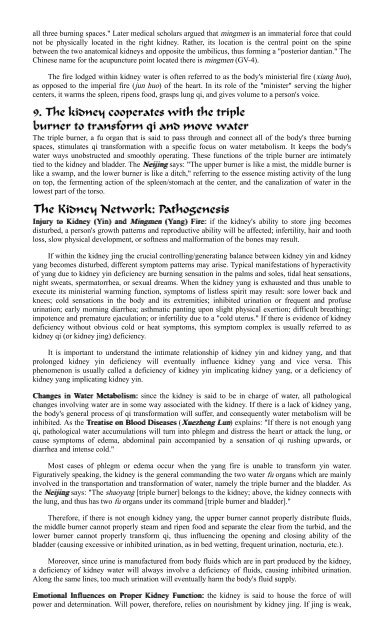Create successful ePaper yourself
Turn your PDF publications into a flip-book with our unique Google optimized e-Paper software.
all three burning spaces." Later medical scholars argued that mingmen is an immaterial force that could<br />
not be physically located in the right kidney. Rather, its location is the central point on the spine<br />
between the two anatomical kidneys and opposite the umbilicus, thus forming a "posterior dantian." The<br />
Chinese name for the acupuncture point located there is mingmen (GV-4).<br />
The fire lodged within kidney water is often referred to as the body's ministerial fire (xiang huo),<br />
as opposed to the imperial fire (jun huo) of the heart. In its role of the "minister" serving the higher<br />
centers, it warms the spleen, ripens food, grasps lung qi, and gives volume to a person's voice.<br />
The triple burner, a fu organ that is said to pass through and connect all of the body's three burning<br />
spaces, stimulates qi transformation with a specific focus on water metabolism. It keeps the body's<br />
water ways unobstructed and smoothly operating. These functions of the triple burner are intimately<br />
tied to the kidney and bladder. The Neijing says: "The upper burner is like a mist, the middle burner is<br />
like a swamp, and the lower burner is like a ditch," referring to the essence misting activity of the lung<br />
on top, the fermenting action of the spleen/stomach at the center, and the canalization of water in the<br />
lowest part of the torso.<br />
Injury to Kidney (Yin) and Mingmen (Yang) Fire: if the kidney's ability to store jing becomes<br />
disturbed, a person's growth patterns and reproductive ability will be affected; infertility, hair and tooth<br />
loss, slow physical development, or softness and malformation of the bones may result.<br />
If within the kidney jing the crucial controlling/generating balance between kidney yin and kidney<br />
yang becomes disturbed, different symptom patterns may arise. Typical manifestations of hyperactivity<br />
of yang due to kidney yin deficiency are burning sensation in the palms and soles, tidal heat sensations,<br />
night sweats, spermatorrhea, or sexual dreams. When the kidney yang is exhausted and thus unable to<br />
execute its ministerial warming function, symptoms of listless spirit may result: sore lower back and<br />
knees; cold sensations in the body and its extremities; inhibited urination or frequent and profuse<br />
urination; early morning diarrhea; asthmatic panting upon slight physical exertion; difficult breathing;<br />
impotence and premature ejaculation; or infertility due to a "cold uterus." If there is evidence of kidney<br />
deficiency without obvious cold or heat symptoms, this symptom complex is usually referred to as<br />
kidney qi (or kidney jing) deficiency.<br />
It is important to understand the intimate relationship of kidney yin and kidney yang, and that<br />
prolonged kidney yin deficiency will eventually influence kidney yang and vice versa. This<br />
phenomenon is usually called a deficiency of kidney yin implicating kidney yang, or a deficiency of<br />
kidney yang implicating kidney yin.<br />
Changes in Water Metabolism: since the kidney is said to be in charge of water, all pathological<br />
changes involving water are in some way associated with the kidney. If there is a lack of kidney yang,<br />
the body's general process of qi transformation will suffer, and consequently water metabolism will be<br />
inhibited. As the Treatise on Blood Diseases ( Xuezheng Lun) explains: "If there is not enough yang<br />
qi, pathological water accumulations will turn into phlegm and distress the heart or attack the lung, or<br />
cause symptoms of edema, abdominal pain accompanied by a sensation of qi rushing upwards, or<br />
diarrhea and intense cold."<br />
Most cases of phlegm or edema occur when the yang fire is unable to transform yin water.<br />
Figuratively speaking, the kidney is the general commanding the two water fu organs which are mainly<br />
involved in the transportation and transformation of water, namely the triple burner and the bladder. As<br />
the Neijing says: "The shaoyang [triple burner] belongs to the kidney; above, the kidney connects with<br />
the lung, and thus has two fu organs under its command [triple burner and bladder]."<br />
Therefore, if there is not enough kidney yang, the upper burner cannot properly distribute fluids,<br />
the middle burner cannot properly steam and ripen food and separate the clear from the turbid, and the<br />
lower burner cannot properly transform qi, thus influencing the opening and closing ability of the<br />
bladder (causing excessive or inhibited urination, as in bed wetting, frequent urination, nocturia, etc.).<br />
Moreover, since urine is manufactured from body fluids which are in part produced by the kidney,<br />
a deficiency of kidney water will always involve a deficiency of fluids, causing inhibited urination.<br />
Along the same lines, too much urination will eventually harm the body's fluid supply.<br />
Emotional Influences on Proper Kidney Function: the kidney is said to house the force of will<br />
power and determination. Will power, therefore, relies on nourishment by kidney jing. If jing is weak,

















